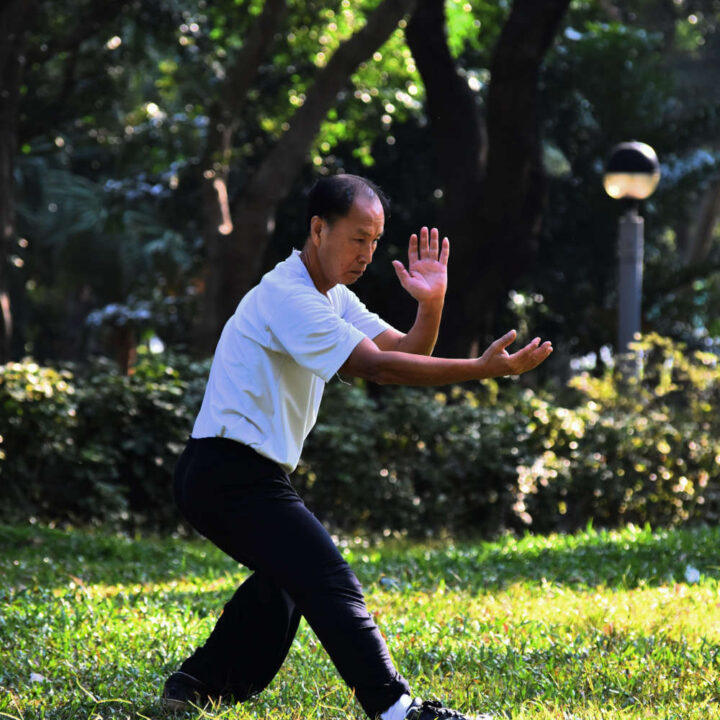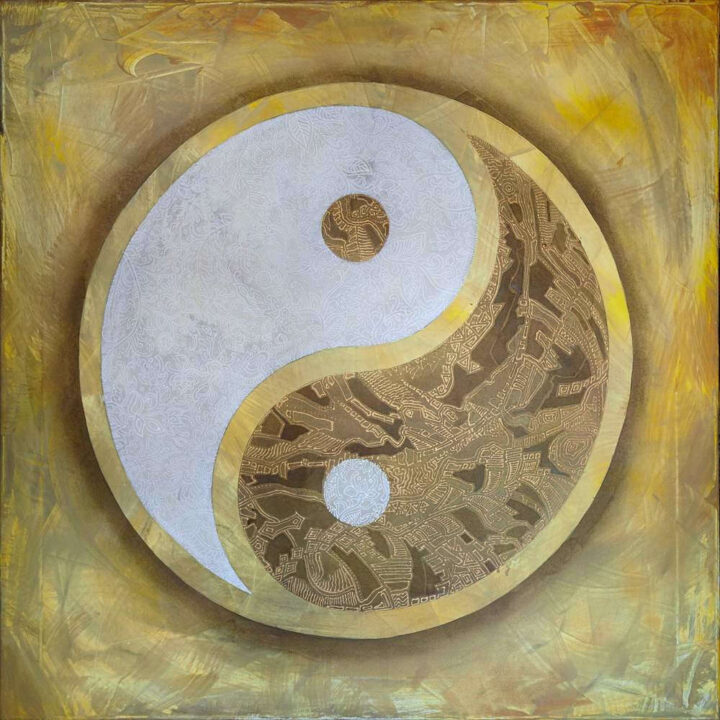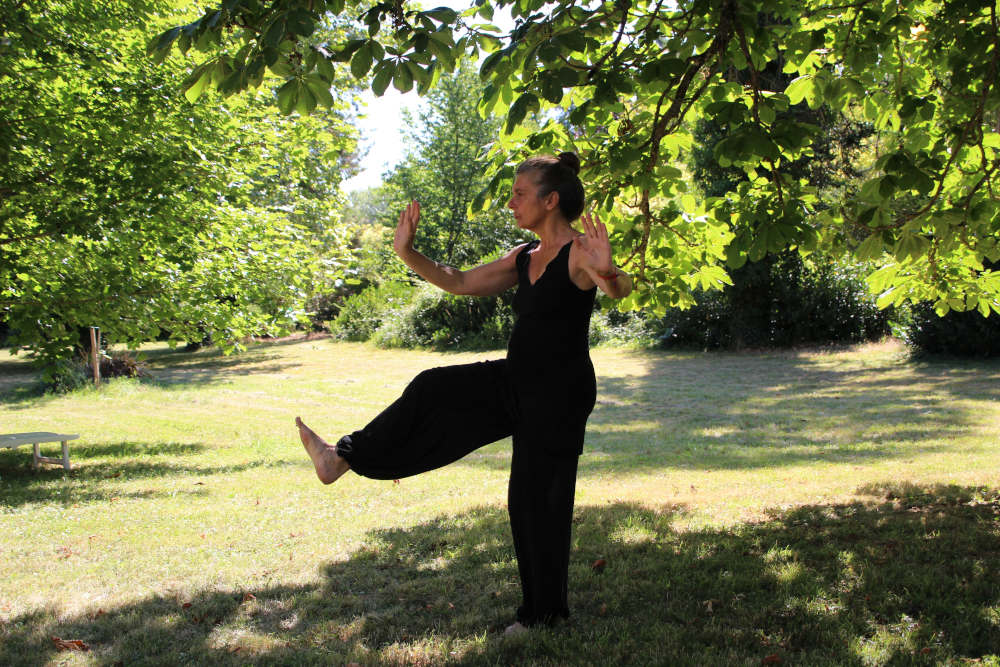I became interested in Tai Chi after reading about it in a magazine as a gentle way to train and relax your body. At the time, I was looking for a way to balance my job as a manager at an IT firm.
I didn’t want to go to the gym like everyone else or sweat my way through the woods like a runner. I was looking for a less strenuous way to exercise while also relaxing mentally.
Self-Study
My path to Tai Chi took me through a number of teachers and courses. The first Tai Chi form, on the other hand, I learned from a textbook.
At the time, I was 35 years old, and this book was my first introduction to the inner martial art of Tai Chi. The book’s very precise step-by-step instructions and the exercises it described were very well explained to me.
The Yang form was demonstrated, which is a very good and simple form for learning the many facets of Tai Chi. I wasn’t really aware of what I needed to pay attention to at the time, so I mostly just learned the movement sequence of the form, strictly following the instructions in the book.

Tai Chi Instructor
In my youth, I took karate lessons for a few years before abandoning martial arts. At first, I thought that my remaining karate knowledge would make it easier for me to learn Tai Chi. That, however, was not the case.
As a result, I desired to have a teacher from whom I could learn movement principles. Unfortunately, I was living in a region with a limited supply of professional and effective teachers at the time. Finally, I enrolled in a Tai Chi course geared more toward gymnastics and rehabilitation, and there I learned my first complete form – a Yang style form – from the teacher.
This course, as good as it appeared for beginners, became tedious after a while. There was no further progress.
The only thing they taught was an empty form with no content; there was no application or explanation of the various movements; instead, the teacher tossed around terms from Chinese philosophy and healing with no emphasis on an understandable explanation.
My Experience
- Mental Stability
- Balance
- Inner Calm
- Less Stress
- Better Body Awareness
- Mindfulness
- Improved Physical Balance
New Instructor
I then switched to a different Tai Chi instructor. His calm manner of explaining and demystifying complicated terms was instrumental in shaping my current understanding of Tai Chi. His open nature and desire to teach me something were what initially drew me in.
It was critical for me to learn a martial art and improve my body awareness. The first successes have come quickly as a result of regular joint practice.
My understanding of Tai Chi has also advanced very quickly. This is because all descriptions and explanations were kept very rational.

The Quest for Chinese Mysticism
The physical processes were explained using sports science and physical knowledge. These scientific and logical approaches were much easier for me to understand than explanations based on Chinese culture.
Many Tai Chi teachers only use the Chinese way of thinking to explain things, ignoring the fact that the Western way of thinking has grown up in a very different way than the Chinese.
As a result, it is not uncommon for confusion, legends, and eventually false explanations to contribute to Tai Chi being interpreted as “supernatural.” Being disillusioned aided me greatly at the time.
Tai Chi contains no supernatural elements! Friends frequently asked if I had “mystical experiences” or if I possessed special powers or energies. All of this is nonsense.
If you expect something like that from Tai Chi, you are mistaken about this type of movement form. Hollywood movies and teachers who want to make money with Tai Chi or martial arts give the impression that you learn special mystical or mysterious abilities.
My Personal Experiences with Tai chi
I can only report positive results after years of more or less consistent training. I’ve gained mental stability and calm. My mindfulness has gotten better, and I am now more aware of the here and now in my everyday life.
When I’m in a stressful situation at work, I calm down faster. To relieve stress, I occasionally perform Tai Chi movements in the office.
My body awareness and balance have improved as well. However, I must admit that Tai Chi has inspired me to return to other sports. I began exercising by jogging and doing stretching gymnastics and body weight training.
So my overall physical fitness has improved, but I cannot attribute these improvements solely to Tai Chi training.
How Long Did it Take to Take Effect?
Individual aspects of Tai Chi were already effective after the first practice session. I became calmer and more relaxed, my body loosened up. At the same time, I was able to mentally switch off from my job and other life during the exercises.
These effects occur very quickly and still occur today with every Tai Chi practice session.
It takes a little time to master a complete form. It depends on how often you practice and memorize the form. For me it took a few weeks, but I practiced almost every day.
Does Tai Chi Also Have Disadvantages?
In my experience, Tai Chi has no disadvantages. You can train at any age and if you have physical limitations, you should of course consult your doctor beforehand.
Of course, if you expect strong muscles and endurance like a runner or think you can fight with Tai Chi like in an action movie, then you should look for another form of physical activity.

What Qualities Distinguish a Good Tai Chi Teacher?
Every Tai Chi beginner should look for a teacher who can explain the movement principles in a simple and straightforward manner without the use of Chinese terms. Of course, applying the Chinese explanatory model is also interesting. But this requires a lot of background knowledge, so I only recommend it for more experienced practitioners.
Tai Chi, as you may know it from movies, does not involve anything supernatural or mystical. This is not the case; Tai Chi is first and foremost a form of movement instruction that aids in the balance of the body and mind.
Tai Chi is now taught in many places, like sports centers, health centers, martial arts schools, and private training groups.
From my experience, I can say that generalizations about individual teachers’ qualities are impossible. It is critical to visit different teachers and get a sense of their abilities.
Not only is ability important, but so are the training environment and interpersonal relationships.
Be Skeptical
It is critical to think outside the box and to seek explanations and perspectives from other teachers. In the process, I came across a clientele that has established itself in the Tai Chi scene and whom I hold in high regard.
These are people who seek a personal mystical path in a martial art, ignoring the fact that the martial art is, first and foremost, a physical craft. Tai Chi continues to have a bad reputation because of how it is used and because of how many people misunderstand Taoist ideas.
Tai Chi also works well in the absence of Taoism. Nonetheless, this philosophical current can be a wonderful addition to one’s life. I say “philosophical current” on purpose. There is also religious Taoism, but it has no influence in Western culture.

Self-Directed Learning
Tai Chi can be learned by self-teaching to some extent. Anyone who claims otherwise is most likely attempting to fill their classes with more students. My experience has taught me that self-directed and self-exploring learning can be extremely beneficial.
Classes with a good teacher are, of course, preferable. However, a certain level of independence always allows for some freedom to explore one’s own experiences. The risk of learning incorrect movements increases, but if you have good literature or instructional videos explaining what to look for, you can make good self-study progress.
Practicing and learning at the same time has worked well for me. I practice with a good practice partner and attend Tai Chi seminars. I study with exercise DVDs and spend a lot of time learning the theoretical fundamentals.
I can’t live without reading specialized literature because it provides systematized knowledge that can never be prepared in the same way in class or during practice. Theory and practice are two distinct pairs of shoes. Both are dependent on one another and complement each other.
My Advice to Newcomers
- Be critical of yourself and ask yourself what you expect from Tai Chi.
- Perform exercises using books, DVDs, and internet videos.
- Attend a practice class or a one-day or weekend seminar.
- Discuss Tai Chi and the classes with the teacher’s students.
- Be open to different styles, teachers, and points of view.
- Tai Chi is not mystical or supernatural in any way.
- Don’t be fooled by phony Chinese behaviors.
- Always conduct your own research, consulting the literature and the internet.
- Have fun experimenting
- Practice a little every day
Author: Reiner – Founder 24hourbrain.com


